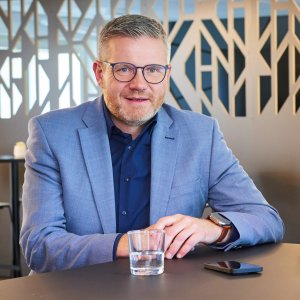Interview with Markus Tröge
Markus Tröge, Head of Health and Social Management
Consulting for health and social management issues.
experts.avitea.de"We catch our employees and female employees - in every situation in life".
avitea offers all employees free health and social counseling, which can be used in the event of problems of a financial, social or family nature. Markus Tröge, Head of Health and Social Management at avitea, answers the questions in our interview about what exactly the service looks like, what options are available and how to make an appointment.
Mr. Tröge, you are a health and social manager at avitea. What does that mean in concrete terms?
Markus Tröge: Exactly, I'm in my thirteenth year here at avitea as a health and social manager. avitea was far-sighted very early on and realized that, especially in the area of human resources services, you can show employees a lot of appreciation by offering health and social counseling. Within the scope of my consulting, I try to provide support especially in the psychosocial or also in the financial area. We can offer our employees a wide range of counseling services. I am available for this three days a week - from Monday to Wednesday. Since many employees come from out of town and work a three-shift system, I try to be here both in the morning and in the afternoon.
What topics does your consulting cover? With which problems can I turn to you as an employee?
Markus Tröge: The spectrum actually ranges from A to Z. Employees can come to me with issues around alcohol, burnout, chronic illnesses, family difficulties, depression, all the way to eviction from their home. So there's nothing that doesn't exist. Many people find it difficult to talk to their own environment about their problems. Perhaps because they do not want to burden their environment or because they do not want to appear weak. In such cases, sometimes it's just a matter of letting everything out for five minutes and crying, or rather, having a good cry. In such cases, it's good to have a kind of "emotional trash can" or lightning rod in the house. Someone who can simply catch people and with whom they can be sure that what is discussed will not be passed on. Neither to the management nor to the personnel officers or any other person. It is often good just to know that there is a contact person on site. I always think of it in terms of a picture. I used to climb. If the mountain guide goes ahead when I'm climbing and ropes me up, then I'm secured. Then I go with a completely different feeling than when I'm not secured.
In what framework does the consultation take place and how can I make an appointment for it?
Markus Tröge: The consulting mostly takes place here at avitea headquarters in my office. But I'm also on site at our customer companies or make home visits if someone's mobility is restricted due to illness, for example. Of course, advice can also be given by telephone, but I prefer personal contact in order to be able to help people as effectively as possible. An appointment can be made, for example, through the personnel officers. They have access to my calendar and can set an appointment there directly. Sometimes I am also approached by supervisors, foremen or foremen from customer companies who have noticed a change in an employee. Then I see to what extent I can intervene to help. Of course, this must be discussed with the employee in advance, as I will not interfere with his or her personal rights. Last but not least, there is of course the possibility that those seeking advice approach me spontaneously and directly. In emergency situations, I will also help immediately or we will then arrange a prompt appointment.
Who is the target group for social and health counseling at avitea?
Markus Tröge: The social and health counseling service is aimed primarily at our employees at customer companies. We want them to have a contact person here at our company for their problems and concerns who is not based directly at the customer's company. In addition, we also advise people up to the first degree of family of our employees. This means, for example, the spouses or children of our employees. As an example: the wife of an employee is suffering from cancer. Then she is welcome to come to me for counseling. We then look at what measures we can take to support the "family" system at this point. In such cases, I can also act as a liaison to further organizations. For our internal employees, I also offer classic coaching, for example in the area of leadership development.
What should I think of as you acting as a liaison or facilitator?
Markus Tröge: As an example: I am not a specialist in debt counseling. But I do have a cooperation partner here in the form of Arbeiterwohlfahrt. I can make an appointment with them, for example - of course, only if the person who came to see me releases his or her confidentiality. I am subject to the legal duty of confidentiality, which can only be broken if I am given permission or if there is a danger to myself or others. Overall, however, I have a good network and can refer people to hospitals, addiction clinics, the city or doctors in addition to debt counseling. It is often a great help if the employees are relieved of this first step. I think it's very important that I'm not just a desk person or a word person, but that I also try to get something going immediately in the presence of the employees. So that the employees see that they are being taken care of directly: "I'm not just a personnel number, but I'm valuable here and something is being done for me here." And that is then often the igniting factor that makes people feel a little better about their situation. In addition, as an official body, I can perhaps have more of an effect than if someone calls the city or the hospital privately.
And how "bad" does my problem have to be for me to come to you with it?
Markus Tröge: That varies greatly and also depends on the personal feelings of the individual. There are people who seek help at a very early stage. That's a good thing, too, because we can simply help a lot more before the child has literally fallen into the well. Others, on the other hand, carry their problems around with them for a very long time. Especially if the problems are very burdensome. That's why I always appeal to HR officers or foremen to be vigilant and talk to me if they feel that a colleague is doing very badly. That being said, you can't weight the severity of a problem. Breaking up with your first girlfriend at 17 can feel just as tragic and dramatic as a life-threatening illness. In any case, you can come to me with your problems. I then try to help within the scope of my possibilities or to refer to an expert, a counseling center.
What training do you have to support people?
Markus Tröge: I originally come from the field of psychooncology - that is, psychological care for cancer patients - and have also specialized in burnout syndrome. However, I am also trained as an emergency counselor. This means that I can also provide support in bereavement care. I also have art therapy training, am a mental coach and fitness trainer. Especially in cases of depression, burnout or cancer, there is the possibility to use the resource of sports. If someone has already used sport as a teenager or young person - for example, also for stress management - then you can try to pick up where you left off.
That sounds exciting! To what extent can you help employees as a fitness trainer?
Markus Tröge: Sports and exercise can be very helpful when the soul is not doing so well. When someone is sad or stressed, I sometimes ask: "What did you do in the past when you were sad?" Often I get the answer, "I went for a run. I went to the woods. I went to the gym." And of course, this strategy can help again today. Then, for example, I can work out an exercise plan with the person. But the same strategy also works in other areas, such as music. You can dig up your old instrument from the attic or write a song about your problems or current situation. In conversation, I quickly notice what type of person I have sitting in front of me, whether it's more visual, auditory or haptic. If someone is close to nature, then you might also advise, "Just write down your problem, go into the woods, and bury it somewhere." So there are many different approaches. Accordingly, it's somewhat of an advantage that I'm trained in different directions. And sometimes it's actually the case that sport can act like an antidepressant. Endurance sports in particular are very helpful. And then maybe you can get to the core or the trigger of the whole problem. Of course, the best thing is not only to work on the current symptom, but also to keep an eye on the cause.
What is special about your social and health management offering?
Markus Tröge: Our offer here at avitea is unique from my point of view. I know of one or two other companies that offer social counseling sporadically, but never in the same quality and quantity as avitea. That is what makes us stand out. As I said, I am now in my thirteenth year at avitea and I can really say that this social, appreciative approach is really lived and supported here. What is special about what I offer is, above all, the holistic approach. This gives me the opportunity to uncover the different resources of the individual(s) relatively quickly and make them usable. This also means that the offer does not end with psychosocial counseling. I then analyze together with the respective person: What resources does the person have? Where have these resources been buried because of the problem? Where can they be rediscovered? How can the employee be guided to work these things out for himself or herself again? The classic idea here is: "help for self-help".
Has health and social care counseling changed in the era of Corona?
Markus Tröge: Yes. There are definitely managers who approach me because they have noticed a change in their employees during or after the Corona period. There are several reasons for this. In many households, both parents work and there is no possibility of a retreat in terms of space. It is more or less normal today for a family with two children to live in a three-room apartment. If you then have two school-age children and no study yourself and sit in front of your coffee table without an office chair, your back will start to hurt after two hours. And then the children are also there and have to be looked after. These are stress factors. In the Corona era, not everyone has the opportunity to create spatial distance for themselves. Particularly in the case of individuals, it is also the case that increased abuse of medication or alcohol can be detected here. In addition, according to health insurance companies, depression has increased by 40 percent in the last year and a half. During this time, when gyms were also closed, for example, there were few compensation options for one or the other to reduce stress. This can lead to an increased potential for aggression, which in turn can lead to addictive behavior or similar.
How has consulting changed in the age of Corona? Do you have the opportunity to reach people digitally as well?
Markus Tröge: Yes, the possibility to do a consultation via videocall exists, of course. Beyond that, you can also do it all over the phone. I call it "first aid for the soul on the phone". If it's about a person who is not so communicative in a phone call, then we do it here and there by e-mail and hope that it will bear fruit. But I still prefer face-to-face consultations, because then I can see the person and interpret the body language. Does what is said also match the body language shown? These are subtleties, I don't pigeonhole them, but it is necessary to understand the individual, to see his or her inner conflict, it's not the ultimate, but it's something you should consider, I think. And as I said, it can also show the extent to which the person is also torn.

Recent article:

27 September 2024
How employees in temporary employment benefit from industry surcharges

23 January 2024
How to recognize the right time for a job change

21 December 2023
Tips for a successful job search

09 November 2023
What your reference really says

01 September 2023
Interview with the new Managing Director Markus Humpert
